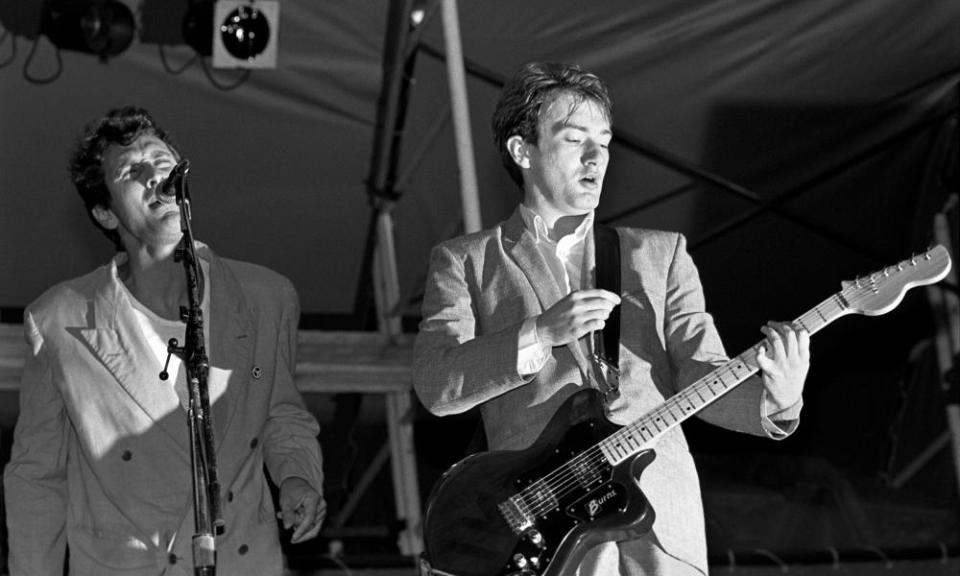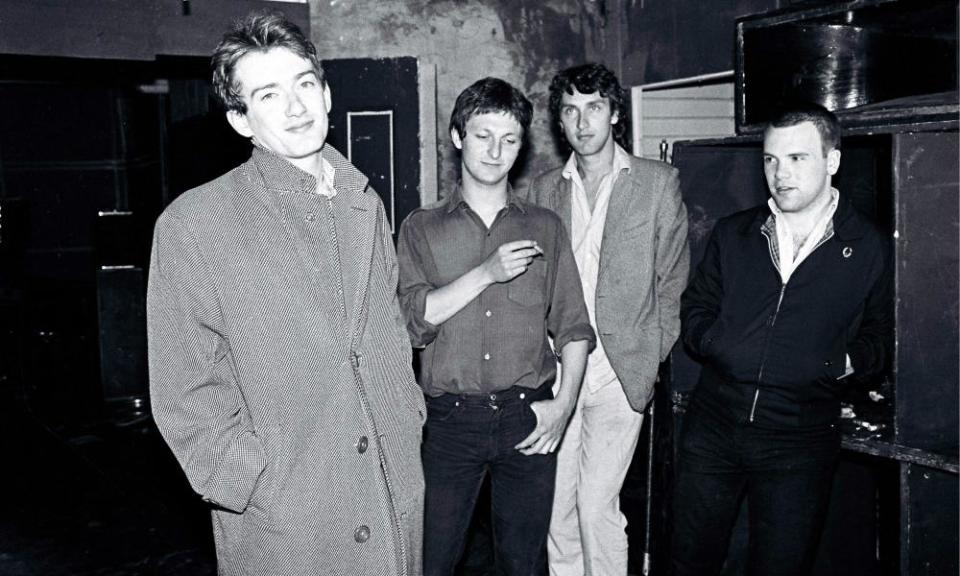Gang of Four: 'They made me realise anything is possible'

Damien Hirst is talking about the epiphany he had at the age of 14. It was 1979 and he’d been “a bit wayward” after his parents’ divorce two years earlier. “Then I got done for burglary,” he says. “I stole a record collection from someone’s house. Among the records was Entertainment! by Gang of Four. I loved it because it made me think. After that, I wrote ‘Gang Of Four’ on my school blazer and had their button badge. I used to copy their artwork on to my school books. I got into the art world because, through Gang of Four, I realised anything was possible. I thought, ‘I’m fucking doing what I want.’”
Michael Balzary – now better known as Flea, bass-player with the Red Hot Chili Peppers – was undergoing a similar experience 5,000 miles away, also triggered by the seminal leftish Leeds post-punk band. Balzary had grown up thinking rock music was for “stupid people”. He’d wanted to play jazz trumpet. He only joined a rock band because a mate was in it. “Then I heard Entertainment! and it opened my mind to everything,” he says. “I didn’t care about virtuosity any more. You could be a confused kid like me, not knowing how to play that good, and still make something incredibly fucking important, like Gang of Four.”
Today, both men are involved in The Problem of Leisure, an album of remarkable versions of Go4 songs featuring artists from around the world. Hirst has created the artwork while Flea and bandmate John Frusciante have reworked Not Great Men, a song about how history is made not by lauded individuals, but by people with power. Despite the rather bleak subject matter, it features a children’s choir, who make the track strangely joyful. “The kids didn’t have to stare into the abyss of existential despair to sing,” says Flea with a laugh.
The illustrious cast also includes Gary Numan, Massive Attack’s Robert del Naja (AKA 3D), members of Rage Against the Machine and System of a Down, David Bowie bassist/singer Gail Ann Dorsey, and Idles. La Roux makes an appearance too, transforming Damaged Goods into a euphoric electro-disco banger.
We once met Bowie and he did this 'We are not worthy' thing. I was amazed
The project was conceived by Go4 guitarist Andy Gill to mark Entertainment!’s 40th anniversary in 2019, but wasn’t finished. Gill died last February from a respiratory illness that his widow, Catherine Mayer, suspects was undiagnosed Covid-19. Mayer, an author and founder of the Women’s Equality party, wanted to complete it as a “celebration” of her husband and his band. Although Go4 never had a hit – Entertainment! charted at 45 – they are acknowledged as an influence by everyone from U2 to REM and Nirvana. “We once met Bowie backstage,” says Mayer. “I was a bit awestruck and he did this ‘We are not worthy’ thing at Andy. I was amazed.”

La Roux’s Elly Jackson wasn’t born when Entertainment! was released, but says the “angular rhythms” of Damaged Goods inspired In For the Kill, her 2008 breakthrough hit. “I even referenced the line, ‘Sometimes I’m thinking that I love you but I know it’s only lust.’ Damaged Goods is a great pop song. On the one hand, it’s a comment on capitalism – ‘I can’t work, I can’t achieve.’ And on the other, a romantic love song. They were brilliant at double meanings.”
For Rage Against the Machine guitarist Tom Morello, Go4 offer “a Gramsci-level understanding of the world in a great punk-funk band”, Gramsci being the Italian Marxist philosopher who was imprisoned by Mussolini. “The sounds that came out of the guitar,” adds Morello, “were a deconstruction of the instrument – in the same way the lyrics deconstructed everyday life in capitalist society”.
What I really got from the band was the idea that I didn't have to confront things head-on
Damien Hirst
As a “crazy kid on acid who hadn’t been politically conscious”, Flea found that Entertainment! opened his mind to “systemic racism and oppression of peoples”. And Hirst, who would go on to win the 1995 Turner prize, was inspired by the cartoon on the album’s sleeve showing a smiling cowboy shaking hands with a native American. “He is glad the Indian is fooled,” the caption reads. “Now he can exploit him.”
Hirst says: “All that messaging was beauty to me. What I really got from the band was the idea that I didn’t have to confront things head-on. That really helped me in the art world. I was mates with Joe Strummer. He was telling me that he was out there at the front of the Clash getting spat on. My mum wouldn’t let me dress like a punk, so I had a bag of clothes at the bottom of the garden. I wanted to go ‘Fuck off’ to the system, but you start thinking of other devious ways to do things.”

Gill and vocalist Jon King first met in art lessons at school in Kent, but formed Gang of Four with bassist Dave Allen and drummer Hugo Burnham at Leeds University. Rehearsing in the film society’s space, Gill channelled Booker T and the MGs guitarist Steve Cropper and Dr Feelgood’s Wilko Johnson into his own revolutionary staccato style. For Morello, a Van Halen and Mötley Crüe fan until he heard Go4, Gill “changed the way guitars were played. He defied the convention that says you should play for the song. In a lot of ways, Andy played in the opposite direction to the song.”
Hirst recalls: “In Leeds back then, if you liked Gang of Four you were called ‘a puff’. Forty-year-old men waited to kick your head in. People were miserable because there was no money and unemployment. My sister wasn’t allowed out because of the Ripper. It was nuts – violence, threats, anger, poverty. But it led to all this creativity.” Years later, when Hirst visited Los Angeles as a successful artist, he was amazed when Flea came up to him and said: “You’re from Leeds, aren’t you? Gang of Four!”
Gill produced the Chilis’ eponymous 1984 debut album. While they all enjoyed walks in the Santa Monica hills, things weren’t quite so blissful in the studio, where arguments were common. “We were obnoxious, drugged-up maniacs,” Flea says. “We thought we were great and wanted to capture that rawness – and Andy was trying to produce a polished recording.”
As the Chilis discovered, neither Gill nor Go4 were prone to compromise. A Top of the Pops appearance was cancelled when the band refused to change a line about “rubbers” – condoms – in At Home He’s a Tourist. The BBC then banned the cheekily anti-military track I Love a Man in a Uniform during the 1982 Falklands conflict. This didn’t stop their influence spreading. The Dandy Warhols, who feature on The Problem of Leisure, discovered Go4 in US dance clubs where, says their lead singer Courtney Taylor-Taylor, “the bass and drums were a bazooka to the dance floor”.
If Andy smashed a guitar on stage, the audience would take the pieces home
When the original rhythm section left, Sara Lee and later Gail Ann Dorsey joined, and the band continued to be a fearsome live act. Dorsey remembers one gig in particular. “Jon and Andy were racing across the stage. I was spinning and Jon went head first into the headstock of my bass. He got up with an imprint of the tuning pegs on his head – but kept on singing! If Andy smashed a guitar, the audience would take the pieces home.” For the new album, she covered We Live As We Dream, Alone and was struck by how its theme of isolation “is perfect for 2020 to 2021”.
Mark Bowen, singer with contemporary post-punks Idles, says: “Without Gang of Four, Idles wouldn’t exist.” He first heard Damaged Goods on one of his dad’s mix tapes on holiday, and has run a Bristol club night called Entertainment! with his bandmates. Bowen thinks the “post-punk 2.0” generation, meaning the Strokes, Franz Ferdinand, Maximo Park and the Futureheads, “all had the Gang of Four sound”.
In later years, Gill revitalised the band with younger musicians. Vocalist JJ Sterry replaced King in 2012 and became close friends with Gill, who once told him where the Entertainment! title came from. “Andy was sitting in some working men’s club where they played early on, sharing the bill with a burlesque dancer and a standup comic. Someone said, ‘We’re all in the entertainment industry!’ Andy loved that.”
On stage, Gill was a seething, feedback-wailing presence, but everyone I talk to remembers a kind, warm soul who was excited about new music and could be as funny as a standup. When Mayer met her future husband at a party in 1990, he was wearing a frock coat and white jodhpurs. “He’d taken an entire serving bowl of trifle from the buffet and hadn’t been able to find a spoon. So he was scooping it out from under his arm with his hand. I started laughing at him and never really stopped for the next 30 years.”
Mayer says Gill’s perfectionism didn’t just apply to music, but to “every area of our lives. If we had guests, he’d insist on cooking. By the time the food arrived at 4am, everyone would be too drunk to eat. But it would be absolute perfection.” True to form, Gill oversaw The Problem of Leisure’s early mixes from his hospital bed.
Flea never got the chance to say goodbye. He’d been emailing Gill in the days before his death and then one went unanswered. The loss moved him to tears. Years previously, he had been hurt when Gill said a Chilis song “ripped off” Gang of Four. But in 2018, when Gill asked Flea to contribute to The Problem Of Leisure, the pair “talked about everything, about that remark and why it hurt my feelings – that we had our own thing, but were grateful for the influence he had on us. He said he hadn’t meant it like that.
“We talked about the arguments while recording our album and I apologised for anything I did that was offensive and he did, too. At the end, I was able to talk to him on the phone and say: ‘Andy, I love you.’ I’m so glad I was able to tell him that, and to mend the fence and re-establish a friendship with someone who shaped my aesthetic and approach to music profoundly.”
Hirst, meanwhile, says he is still channelling the “energy” he got from Go4. He’s delighted that, of all the images he sent for The Problem of Leisure, Gill chose Dog With Bone, a soft toy made from pipe-cleaners. “I got a load of kids to make it,” says the artist. “There’s that great quote from Brancusi, the sculptor. ‘When we’re no longer children, we’re already dead.’ That’s the feeling I got from Gang of Four.”
• The Problem of Leisure is out on 28 May (Gill Music). A limited edition box set, Gang of Four 77-81, is out on Matador. Warpaint’s version of Paralysed is out on 19 March.

 Yahoo News
Yahoo News 